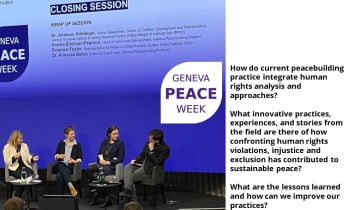Geneva Peace Week 2022 (part 2/3) - QUNO continues to spotlight human rights, social and economic justice, and political participation as foundational to sustainable peace

As one of the founding organizations of the Geneva Peace Platform (GPP), QUNO Geneva continues to play a role in the development of the week’s areas of focus, and on bringing attention to the relationship between human rights and sustainable peace.
QUNO understands peace as more than the absence of overt violence or destructive conflict; sustainable peace is fundamentally linked with human rights, social and economic justice, and political participation. This linkage was explored through events in the thematic track on Thursday 3rd November, curated by QUNO Geneva on ‘Rights, Inequalities and Peace: navigating tensions, finding opportunities’ building on the outcomes for the 2021 track edition on ‘Confronting inequalities and advancing inclusion, peace, and SDG16’.
Having this full day dedicated to spotlighting the relevance of human rights was an opportunity to explore human rights not only as a normative framework for the analysis of root causes and to devise just solutions, but as a toolbox and procedural pathways for inclusive decision making and dialogue.
The day’s events also did a deep dive into the notion of inclusion and the diversity of agents of change when it came to overcoming inequalities: from armed and political movements to civil society and national human rights institutions including youth and women’s participation. While the former actors are still under explored and often underrepresented in peacebuilding – it's a damning assessment on how far we have yet to go that we are still having to home in on women and youth participation.
Normative framework for the analysis of root causes
Importantly, events also addressed the challenges around identity politics – and the discrimination minorities face - with a particular focus on LGBT communities. An important take away in terms of prevention, was that the human rights abuse and violations these communities endure often foreshadows trajectories of more widespread violence and conflict and that these communities face heightened and distinctive levels of discrimination and violence, particularly in contexts affected by conflict.
Toolbox and procedural pathways for inclusive decision making.
Interestingly, a workshop specifically addressed the critical need to protect the right to protest in conflict and crisis – as part of the broader rights to freedom of peaceful assembly and association. Indeed, protests in many contexts affected by conflict is the last channel of dialogue or communication, enabling grievances to be aired and heard. All too often protests – rather than the violent responses to them - are seen as a crisis in and of themselves, whereas they should be seen as a hopeful sign that violence is not necessary, and that peaceful means are being sought by civilians to communicate issues of concern, in view of finding non-violent solutions.
The culmination of these discussions took place during the high-level panel moderated by QUNO Geneva’s Peace and Disarmament Representative, Florence Foster on ‘Rights, Inequalities and Peace: navigating tensions, finding opportunities” [see more in part 3/3 [link]].
Click here for a recent QUNO publication on the topic of - Sustaining Peace: How can human rights help? 2016 – 2020 retrospective.


